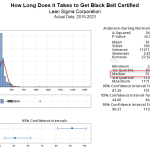How Long Does it Take to Get Lean Six Sigma Black Belt Certified?
How Long It Once Took
A long, long time ago, there was only one way to get Lean Six Sigma Black Belt certified, Classroom training. Yes, that was a long time ago but here is some context to help you understand where we are today. Twenty-five years ago when I became interested in pursuing Lean Six Sigma Black Belt certification, my company had a program, and I had to interview and be selected for the training. Then, I was required to attend a 6-month training program (5 full weeks of classroom training; D.M.A.I.C.) and was required to complete and defend two projects saving at least $250,000. Why does this provide context? Well, if I were still in corporate America today, I'm sure I would still be in a leadership or influential role, as I was when I left over a dozen years ago. And so were my peers, my Six Sigma classmates, my trainers, mentors, and coaches. They are all continuing to advance their careers today. They are professionals who know the value of Six Sigma and were comprehensively trained. They know what it once took to get certified. These are influencers in corporate America today. So, that's the "Right Skew" and not an exaggeration for the conversation on how long it takes to get Lean Six Sigma black belt certified. It can take up to a year in a comprehensive classroom program with mentoring and project requirements.
However, with new technologies, high demand for the skill set (from both individuals and employers), and lack of governance, the means of getting trained and certified have changed the Six Sigma training landscape. Today we have multiple modalities of training and certification:
- Traditional Classroom Training
- Blended Classroom & Virtual
- Virtual (Remote Bootcamp Style)
- Virtual w/Online Course Requirements
- 100% Self-Paced Online
- Proctored In-Person
- Certification Exams
- Online Proctored Certification Exams
As a result, you can literally expect very different completion times for each training mode. Like Lean Sigma Corporation, the International Association for Six Sigma Certification (IASSC), the American Society for Quality (ASQ), and the Council for Six Sigma Certifications (CSSC) each offer certifications after an application and passing a three-hour exam. Providers that offer one of the training methods above typically offer others, and they can have a tough time answering the question of how long it takes because the individual (you) asking typically hasn't decided how they will get trained yet.
Fortunately, using virtual and self-paced methods of training & certification with LMSs and Live Streaming apps, it's not terribly difficult to get some data to help answer the question. And, wouldn't you know it, I happen to have some data that will definitively answer your question: how long does it take to get Lean Six Sigma black belt certified?
It Takes 51 Days to Get Lean Six Sigma Black Belt Certified
Yes, fifty-one days. It takes 51 days to get Lean Six Sigma black belt certified. That's according to the thousands of certified individuals who have registered in our learning system and completed our lean six sigma black belt certification. This statistic is for the "Self-Paced" modality. Our online training and certification program is 100% self-paced, including the certification exam. The image below is actual data (we have obscured "N" for business reasons, "N" is the number of data points) for our Black Belt course completion times measured in days.

Notice the median is 51 days, the mean is 91 days, and the standard deviation is 105 days. This data is "non-normal" and follows more of a logarithmic distribution. Primarily due to the natural boundary at zero days; it's impossible to have negative days to get certified, so there is a natural boundary at zero causing the distribution to skew right. Knowing this, we choose to reference the median to represent best how long it takes to get a Lean Six Sigma black belt certification.
It Also Takes 8 Weeks to Get Lean Six Sigma Black Belt Certified
It takes eight weeks to complete our Virtual and online black belt certification course. We don't need data to prove it because we've designed the program that way. We offer a facilitated online certification program (by request only). Eight weeks of coaching & mentoring calls with you completing lots of juicy work in between! Yes, it's a lot of work, but you're looking for a promotion or a career change, right? Expect to earn it.
It Also Takes 105 Hours to Get Lean Six Sigma Black Belt Certified.. Sort of..
In the world of training & certification, some of the acronyms next to your name require continuing education. If you need PDUs (Professional Development Units) or CEUs (Continuing Education Units) to re-certify your PMP, Agile, Scrum, or other certification, you can apply the 105 PDUs we offer for completing our Black Belt course. Does it actually take 105 hours? Yes, the same way it takes 51 days. These data points are made from a sample of thousands, does it take everyone 105 hours, no, does it take anyone 105 hours, maybe a few but in reality, no. 105 is a "mean." It's the average seat time of hundreds of our users taken many years ago when establishing our PDU policy for the Project Management Institute (PMI).
Seat Time vs. Calendar Time
Have you noticed yet? We just referenced how long it takes to get certified using three different measurement scales (hours, days, weeks). And they are not "Comparable" in this instance. Why you ask? Because how we choose to measure things matters. You should always try to understand the measurement system. So in this case, it's important for you to understand the difference between seat time and calendar time. Seat time refers to the amount of time a student spends actively engaged in learning activities, such as attending lectures, participating in discussions, and completing assignments. Calendar time, on the other hand, refers to the total amount of time it takes to complete a course [completion date - registration date].
What You'll Find Out There in "Internet-Land"
According to recent search results, the average completion time for the Lean Six Sigma Black Belt certification course is between 1 to 3 months. However, you'll obviously find completion times can vary depending on the provider's certification requirements, such as projects or exercise requirements, and training modalities. Here are a couple of examples of what you'll find out there:
- Six Sigma Black Belt through the Management and Strategy Institute is stated to be 30 days.
- Completion time for Black Belt certification through SSGI is quoted at 45 days.
- Lean Sigma Corporation takes 51 days to get black belt certified in their self-paced certification course.
- Lean Sigma Corporation takes eight weeks to get certified in their Virtual/Online program.
- Other sources reference that it takes 6 to 9 months to become Black Belt certified - These are likely Classroom / Mentoring type programs with Projects.
Then There are University Programs
If you have done an online search already, then you know the volume of universities offering Lean Six Sigma training and certification. Most of these programs have a tiered pre-requisite. Villanova for example requires Lean before Green Belt which is a pre-requisite for Black Belt. That means it can take three semesters to get lean six sigma black belt certified (this approach will cost you more as well). Clemson requires Green before Black as do many other schools.
One big rule that is still practiced in the Lean Six Sigma community is that only Master Black Belts can certify Black Belts. Therefore, many university programs do not grant certification, they yield certificates of completion, or they may have a 3rd party provider (typically an adjunct trainer who is an MBB) extend the certification; we do it for some of our university clients.
The Lean Six Sigma Black Belt certification does take a substantial amount of time. It is a sizeable endeavor to pursue for any professional. It's worth it though! The knowledge and skills you'll acquire in training are incredible but even beyond that, the skills and knowledge you'll acquire from leading projects, facilitating meetings, presenting results or challenges, and just practicing your Lean Six Sigma skills in the workplace will put you far ahead of your peers.





